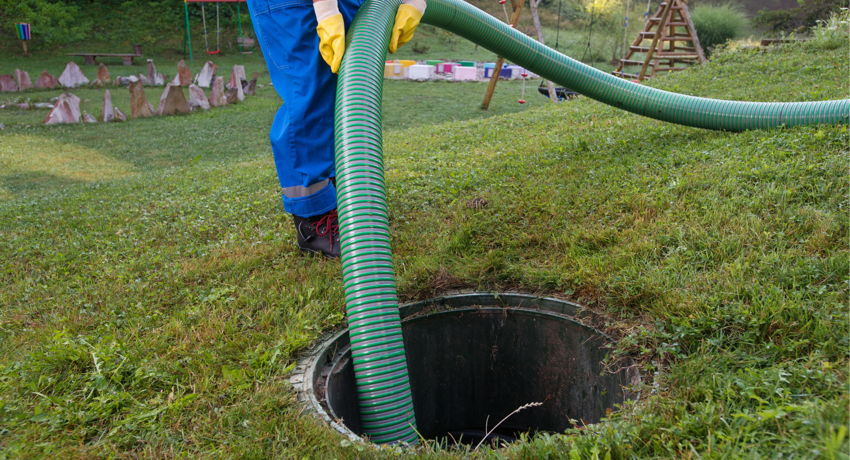Signs of a Failing Septic System: How to Identify and Address Issues

Signs of a Failing Septic System: How to Identify and Address Issues
Date: 13-Sep-2023
Maintaining a septic system is crucial for the proper functioning of a household's wastewater disposal. However, over time, septic systems can develop issues that lead to failure if not addressed promptly. Recognising the warning signs of a failing septic system is essential to prevent expensive repairs, health hazards, and environmental contamination. In this blog post, we will outline the key indicators that your septic system might be on the brink of failure and offer guidance on how to address these issues.
1. Slow Draining Fixtures
One of the initial signs of a potential septic system problem is slow draining fixtures such as sinks, toilets, and showers. When your drains start to empty more sluggishly than usual, it may indicate that the septic tank is reaching its capacity or that the drain field is becoming clogged. This can result from accumulated sludge and solids, reducing the system's ability to properly treat and dispose of wastewater. If you notice this issue, it's recommended to contact a professional septic service provider to inspect and assess the situation.
2. Unpleasant Odours
Foul odours in and around your home can be a telltale sign of septic system distress. A well-functioning septic system should not release unpleasant smells. The presence of strong, persistent odours near your drains, toilets, or in the yard could indicate a problem with the system's ventilation or the drainage process. It might also indicate leaks or cracks in the septic tank or pipes. If you detect such odours, it's crucial to consult a septic system expert to diagnose the issue and recommend appropriate solutions.
3. Pooling Water and Lush Grass
Pooling water or overly lush grass around the drain field area could be an indication that your septic system is struggling. A properly functioning drain field should absorb and distribute wastewater efficiently, preventing the emergence of standing water. When the drain field is compromised due to excessive water usage or clogs, wastewater might surface, leading to soggy patches and unexpected plant growth. Monitoring the health of your yard and promptly addressing any changes can help prevent further damage to your septic system.
4. Gurgling Sounds
Strange gurgling or bubbling noises when you flush the toilet or run water down the drains can signal that air is trapped within the plumbing system. This could be due to a blockage or a failing septic. Gurgling sounds often indicate that the system is struggling to handle the wastewater load, and air is getting trapped in the pipes. If you hear unusual noises, especially in conjunction with slow draining fixtures, it's advisable to seek professional assistance to prevent a potential septic system failure.
5. Sewage Backup
One of the most alarming signs of a septic system on the brink of failure is sewage backup. While most Australian homes have an overflow relief gully (ORG) outside aimed at preventing sewage from backing up inside your home, uf wastewater starts to back up either at or ORG or into your sinks, showers, or toilets, it's a clear indicator that your septic system is overwhelmed and needs immediate attention. Sewage backups pose serious health risks and require immediate intervention. Ignoring this issue can lead to further damage to your plumbing and septic system components.
6. Greener Grass Over the Drain Field
While a lush, green lawn is often desirable, an excessively vibrant and healthy area of grass directly over the septic drain field could indicate a problem. The grass may be benefiting from the nutrients present in the wastewater that isn't being properly absorbed or treated by the drain field. This might suggest that your septic system is not effectively processing and distributing the wastewater, and a professional assessment is needed.
Addressing Septic System Issues
When you recognize any of these signs indicating a failing septic system, taking immediate action is crucial to prevent further damage and health hazards. Here are the steps you should take:
1. Contact a Professional
As soon as you notice any of the warning signs mentioned above, get in touch with your local Ozzi Kleen Distributor or call Ozzi Kleen on 1800 450 767. They have the expertise and tools to diagnose the issue accurately, and to provide you with the best advice with regard to how to rectify your issue.2. Conserve Water
Be mindful of your water usage to prevent overwhelming your septic system. Fix any leaks promptly and consider installing water-efficient fixtures.3. Avoid Harsh Chemicals
Avoid using harsh chemicals or excessive amounts of cleaning agents that can disrupt the natural balance of bacteria in your septic tank.4. Proper Waste Disposal
Never flush non-biodegradable items, grease, or other materials that can clog your septic system. This can significantly extend its lifespan.5. Upgrade When Necessary
If your septic system is ageing or consistently experiencing issues, consider investing in system upgrades or alternative solutions that align with current regulations and best practices such as an Ozzi Kleen, you can learn more about our relevant home sewage treatment systems here.Recognising the warning signs of a failing septic system is essential for maintaining a safe and functional home environment. Make sure that if you suspect that your septic is on its last leg, that you get in touch with Ozzi Kleen to discuss your options 1800 450 767.
Ask us about a water system Find a Distributor Back to articles